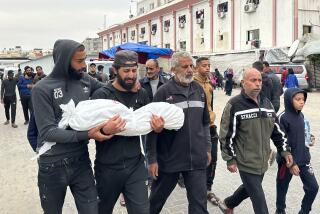U.N. Embargoes Arms Shipments to Yugoslavia
- Share via
UNITED NATIONS — The Security Council voted unanimously Wednesday to impose an international embargo on all arms shipments to Yugoslavia and urged a halt to the fighting in the strife-torn Balkan nation.
In an unusually blunt statement, Secretary of State James A. Baker III told the council, with 11 foreign ministers present, that Yugoslavia’s government is conducting unacceptable aggression against Croatia.
“All parties, especially the Serbs and the Croats, need to stop the fighting,” Baker said. “The cease-fire must be respected as a first step toward shaping a different future.
“However,” he added, “the government of Serbia and the Yugoslav federal military bear a special and, indeed, growing responsibility for the grim future which awaits the peoples of Yugoslavia if they do not stop the bloodshed and reverse the violent course now being pursued.”
Speaking on behalf of the Bush Administration, Baker told the council that the Yugoslav federal military was not “serving as an impartial guarantor of a cease-fire in Croatia.”
“On the contrary,” he said, “it has actively supported local Serbian forces in violating the cease-fire, causing deaths to the citizens it is constitutionally supposed to protect. The military has initiated what can only be described as outright military intervention against Croatia, while repudiating the authority of Yugoslav government institutions which have sought to control it.
“It is equally clear that the Serbian leadership is actively supporting and encouraging the use of force in Croatia by Serbian militants and the Yugoslav military,” Baker added.
Earlier, Yugoslav Foreign Minister Budimir Loncar told the council that “peace is what Yugoslavia needs most at this crucial point. . . . At this point it is not of consequence who was first to start and who escalated the crisis. What matters now is to break this vicious circle.”
The embargo will remain in effect until the council decides to lift it. Members voted to ask Secretary General Javier Perez de Cuellar to offer his assistance without delay to help the peace process.
By a vote of 15-0, the Security Council “strongly urged all parties” to abide by recent cease-fire agreements and expressed “full support” for collective peace efforts being undertaken by the European Community.
Earlier drafts of the resolution, originally introduced by France, had called for a peacekeeping force to be sent to Yugoslavia. But several nations, notably China, viewed that step as a breach of sovereignty and it was removed from the final document.
The resolution urged member states “for the purposes of establishing peace and stability in Yugoslavia to immediately implement a general and complete embargo on all deliveries of weapons and military equipment . . . until the Security Council decides otherwise.”
It called on all states to refrain from any action that might contribute to increasing tension. It asked Javier Perez de Cuellar to contact members of the European Community, the Western European Union and all Yugoslav parties to the conflict and report back to the council as quickly as possible.
The Security Council said it was “alarmed by the violations of the cease-fire and the continuation of the fighting.” It expressed “full support” for the peace process under way in Yugoslavia, taken under the auspices of the EC.
A fragile truce has been in force in Yugoslavia since last Sunday after three months of fighting that started when Croatia declared its independence from Yugoslavia on June 25. About 600,000 ethnic Serbs live in Croatia and refused to consider living in an independent Croatia, separated from Serbia.
The Serb-dominated Yugoslav federal army, while claiming to be a neutral party and asserting that it simply was trying to restore order, has intervened on the side of the Serb guerrillas, independent observers have said.
Baker said that the apparent objective of the Serbian leadership and the Yugoslav military “working in tandem” was to create a small Yugoslavia or greater Serbia which would exclude Slovenia and a rump Croatia.
“We doubt that any of the peoples of Yugoslavia truly wish to pay the high price of this warfare,” Baker told council members. “The social and economic regression and political and economic isolation that will ensue are a price we believe no rational person would wish to pay.”
Chinese Foreign Minister Qian Qichen said his nation supported the resolution with the caveat that China’s consistent position remains that the internal affairs of a country “should be handled by the people of that country.”
The actions taken by the Security Council Wednesday were relatively unusual, in that the body, under the U.N. Charter, usually avoids actions affecting individual nations’ internal matters, preferring to deal with disputes between countries. But Baker suggested that the Balkan unrest threatened peace in the region.
More to Read
Sign up for Essential California
The most important California stories and recommendations in your inbox every morning.
You may occasionally receive promotional content from the Los Angeles Times.













